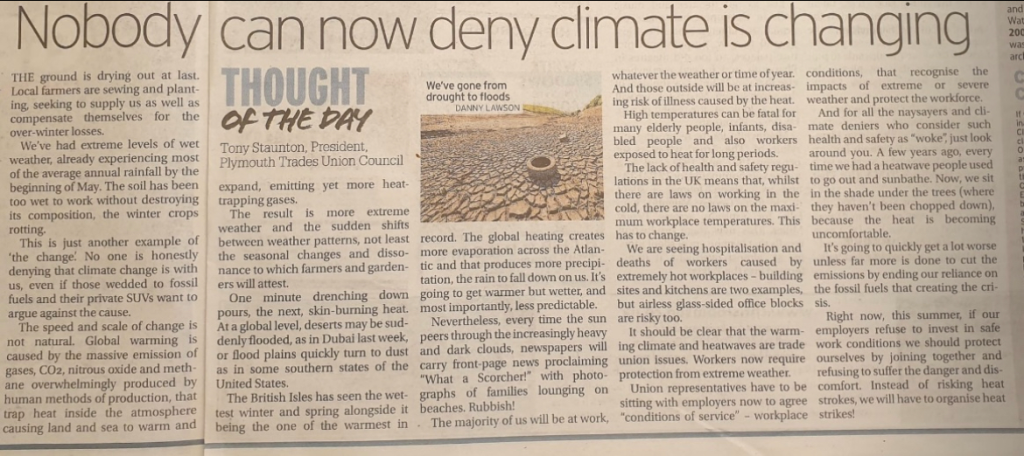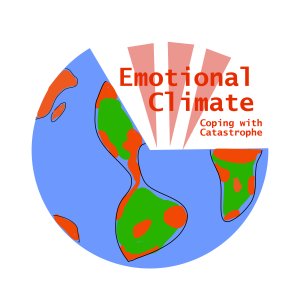My weekly Comment published in the Plymouth Herald newspaper on 7th May 2024, urging the trade unions to take-up the call for maximum temperatures in workplaces, and for union reps to negotiate protections with employers. The trade unions, matching the leadership of the Labour Party, have detracted from organising on the issue of Climate Change and the impacts from the consequent extreme weather, and this has to change. Unions will have to challenge the Labour leadership ahead-of and immediately after the Party’s victory at the upcoming General Election. We must organise for that, now! PS, the weather is scorching hot today!
The ground is drying out at last. Local farmers are sowing and planting, seeking to supply us as well as compensate themselves for the over-winter losses.
We’ve had extreme levels of wet weather, already most of the average annual rainfall by the beginning of May. The soil has been too wet to work without destroying its composition, the winter crops rotting.
This is just another example of The Change. No-one is honestly denying that Climate Change is with us, even if those wedded to fossil fuels and their private SUV’s want to argue against the cause.
The speed and scale of change is not natural. Global warming is caused by the massive emission of gases, CO2, nitrous oxide and methane overwhelmingly produced by human methods of production, that trap heat inside the atmosphere causing land and sea to warm and expand, emitting more heat-trapping gases.
The result is more extreme weather and the extreme shifts between weather patterns. One minute drenching down pours, the next, skin-burning heat. At a global level, deserts may be suddenly flooded, as in Dubai last week, or flood plains quickly turn to dust as in some southern states of the USA.
The British Isles has seen the wettest winter and spring alongside it being the one of the warmest in record. The global heating creates more evaporation across the Atlantic and that produces more precipitation, rain to fall down on us. It’s going to get warmer but wetter, and most importantly, less predictable.
Nevertheless, every time the sun peers through the increasingly heavy and dark clouds, newspapers will carry front page news proclaiming “What a Scorcher!” with photographs of families lounging on beaches. Rubbish!
The majority of us will be at work, whatever the weather or time of year. And those outside will be at increasing risk of sun burn.
The extremes of weather will produce extremes of temperature, with unprecedented heights of heat waves becoming more frequent in the UK.
High temperatures can be fatal for many elderly people, infants, disabled people and also workers exposed to heat for long periods.
The lack of health and safety regulations in the UK means that there are laws on working in the cold – minimum workplace temperatures below which you’d can stop work – but no laws on the maximum temperature.
In recent years, because of global warming, heatwaves across the USA and Europe have led to the deaths of workers either in the outdoors or in extremely hot workplaces – building sites and kitchens are two examples, but glass sided office blocks are just as risky.
It should be clear that the warming climate and heatwaves are trade union issues. Workers now require protection from extreme weather.
Here’s some examples. If we are prevented from getting to work by transport disruption, or the workplace is unusable by flooding, our contracts should ensure we still get paid. If the workplace is too hot (much above 22 degrees Celsius) we should be sent home, and if we work from home, the employer should supply the air-conditioning to prevent over-heating.
Union representatives have to be sitting with employers now to agree “conditions of service” – workplace conditions, that recognise the impacts of extreme or severe weather and protect the workforce.
And for all the naysayers and climate deniers who consider such health and safety as woke, just look around you. A few years ago every time we had a heatwave people used to go out and sunbathe. Now, we sit in the shade under the trees, where they’re still standing, because the heat is becoming uncomfortable.
If our employers refuse to invest in safe work conditions we should protect ourselves by joining together and refusing to suffer the discomfort. Instead of risking heat strokes, we should organise heat strikes!


